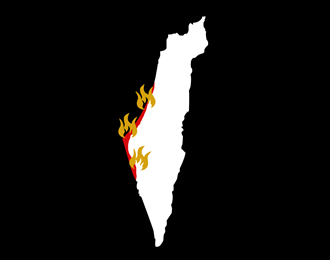Palestinians = Philistines?
30-04-2025 - Posted by Geert-JanOriginally posted on November 29, 2023 - by Andre Piet (this is an edited article from 2011)
Following my earlier weblog “problems around Palestine,” I received several responses. I had written:
…the Philistines, or if you prefer, the Palestinians, but that is the same in Hebrew…
It seems useful to explain this comment a little further.
Palestine – Philistia
The word Palestine and Palestinian is generally understood as a corruption of the Hebrew word plesheth, which is derived from the verb palash (meaning “to roll, to wander” — see Wikipedia). In our understanding, the difference between the words Palestinian and Philistine seems significant, but in Hebrew this difference disappears, because the letters P and F are the same letter, and Hebrew words do not have vowels. In Arabic, Palestinian is: Filasṭīn, Falasṭīn, or Filisṭīn. It is interesting that where the NBG translation (Dutch Bible translation) uses the word Philistea eight times to refer to the land of the Philistines, the Statenvertaling (Dutch Bible translation) consistently translates it as Palestina. For example, in Psalm 108:9 we read in the NBG translation:
Moab is my washbasin; upon Edom I cast my shoe; over Philistea will I triumph.
But the Statenvertaling renders this as:
Moab is my washpot; upon Edom will I cast my shoe; over Palestine will I triumph.
Broadening of understanding
It is peculiar that this designation of Israel’s southwestern coastal strip (Gaza, Ashdod, Ashkelon, Ekron, and Gath) later came to refer to the entire area between the Jordan River and the Mediterranean Sea (“from the river to the sea“). After the deportation of Judah (the Babylonian captivity), the whole land indeed “went to the Philistines,” and thus the Greek writer Herodotus and later also the Roman emperors used the term Palestine to refer to “Eretz Yisrael.” Such broadening of word meaning is not unusual. For example, in the Bible, Asia still referred only to the western coast of Turkey, but it later became the name for all of Turkey (Asia Minor), and today it even refers to an entire continent, including Russia, China, and Indonesia.
not descendants but heirs
Something else must also be explained. When we establish that in Hebrew the terms Philistine and Palestinian are identical, it must not be concluded that the current Palestinians are thus biological descendants of the ancient Philistines. Even if there were indeed genetic connections, that would not be the most essential point. What matters is that the Palestinians are heirs of the Philistines. In the biblical sense of the word, they are their sons (cf. 2 Sam.8:12). They have not only inherited the name but also play the same role as the Philistines once did. It was the Philistines who constantly disputed Israel’s claims to the land and clashed with them over it, and that is exactly what the Palestinians are doing today. Moreover, it is particularly noteworthy that today’s Palestinians are primarily represented in the area where the Philistines once lived: the Gaza Strip. Even Yasser Arafat, long-time leader of the PLO, explicitly claimed to represent the Philistines. In 1998, he declared before the Palestinian Legislative Council:
We Palestinians have centuries of history. We are the descendants of the Philistines.
In short: since the Palestinians have appeared on the world stage, they have fully resumed the role of Israel’s classic archrival. Old times are reliving.

 English Blog
English Blog